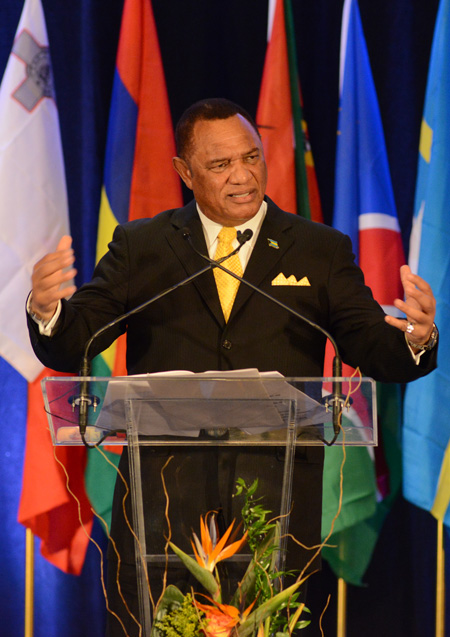|
From:TheBahamasWeekly.com Bahamas Information Services Updates
NASSAU, The Bahamas - Throughout the industrialized world, a high-school graduate earns 10% more than the OECD average, a vocational college graduate 30% more, and a university graduate 70% more. Furthermore, throughout the world, the rate of crime falls when the rate of education rises. In addition, according to the Education for All Global Monitoring Report “if all students left school with basic reading skills, 171 million people could be lifted out of poverty.”
Extracting these statistics from The Organization for Economic Co-operation and Development (OECD) 2014 Education at a Glance Report and other reports, Prime Minister of The Commonwealth of The Bahamas, the Right Hon. Perry G. Christie in his address of the 19th Conference of Commonwealth Education Ministers (19CCEM) said that the overall level of education in a country directly impacts its social elements such as crime, earning power and wealth distribution. Mr. Christie delivered the remarks at the Official Opening Ceremony held at Atlantis Resort on Tuesday, June 23, 2015.
Said the Prime Minister: “15 years ago, as signatories to the United Nations Millennium Declaration, each of the nations represented in this room, and more, agreed to set the world on a path towards more equitable development and opportunity. Put another way, building a Stronger, Safer, more Prosperous and Modern international community was recognized as requiring unprecedented global coordination and co-operation.” He emphasized that this goal has to be at the forefront of planning for all nations.
“Today, however, we must affirm that much remains to be done if we are to keep that promise. We cannot yet claim to have achieved a Stronger, more equitable approach to development,” said Mr. Christie.
He acknowledged the conference was being held at a ‘critical’ time as nations struggled with issues such as crime, unemployment and inequitable wealth distribution. “As we strive to make each of the constituent nations and territories of the Commonwealth safer, we continue to struggle with violent crime within our respective borders. While the world’s murder rate has dropped by 19% in the past eight years, according to the United Nations, smaller countries such as my own continue to struggle with violent crime,” he pointed out.
“But that is not the only challenge. As we work in each corner of the globe to build a more Prosperous Commonwealth, we are constantly reminded that the disparity between rich and poor continues to be dangerously acute. According to the 2014 Credit Suisse Data Book, the world’s top 1% now controls 48% of global wealth.”
In addition, Mr. Christie said other disparities exist in the most basic indicators of human development, such as life expectancy.
“Given these challenges and the enormity of them, it is not an overstatement to say that, for this week at least, you are each of you an integral part of the world’s most important international gathering,” he said. “All the evidence points to the fact that education holds the key to overcoming these challenges.”
The five-day conference is being held in the Caribbean for the first time in 25 years. It is held every three years in a member Commonwealth country and has as its main objective the engagement of Education Ministers in discussions that analyze education systems with a view to executing, monitoring and evaluating action plans over a three-year period. The conference ends Friday, July 26.
|
